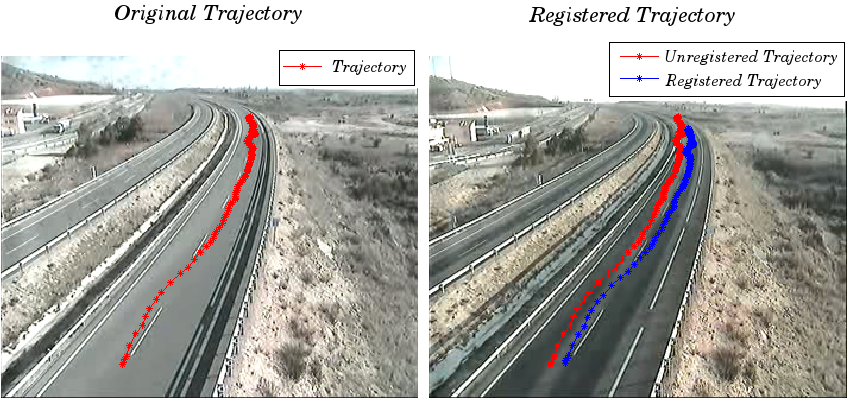Index
- Most outstanding innovation
- Publications
- Demonstration videos
- Final Report of the project in non-technical language (in Spanish)(download)
- Video Summary of the Project
Home
Title: Robust Computer Vision Techniques and its Application to Intelligent Transport Systems to Improve Road Safety, Mobility and Traffic Management.
Administrative reference: SPIP2014-1507
Funding entity: Funded by the Department of Traffic (Dirección General De Tráfico). Resolution of December 19(B.O.E. No. 309, 23 December 2014).
Introduction
Context
Due to the progress of Computer Vision, video cameras have become a low-cost, low-maintenance sensors with a huge potential for providing rich information about traffic in comparison to other sensors. Consequently, video surveillance systems have acquired great relevance in the field of Intelligent Transport Systems (ITS), which aims to improve Road Safety, Mobility and Sustainability by means of suitable traffic monitoring and management.
However, this type of technology still lacks sufficient robustness to guarantee its proper operation when geometric distortions arise due to the change of scale or perspective with which the camera captures an event, or environmental or meteorological factors such as shadows, snow, rain or glare, which noticeably affect the perception of the scene. On the other hand, it is also true that during the last decade there have been substantial advances in the field of artificial vision, in which detectors and descriptors have been developed with a remarkable invariance to geometric variations and lighting.
The Directorate-General of Traffic (Dirección General de Tráfico, DGT) is the government department that is responsible for the Spanish transport network. DGT has a high number of video surveillance cameras deployed along the roads of the whole country, and the monitoring of all of these cameras by DGT personnel 24-hours 7-days is absolutely unfeasible. Consequently, the use of automatic surveillance systems, which are able to call the attention of human operators towards the events of interest, turns out to be a necessary innovation. Thus, the main goal of this project is to develop an automatic incident detection system specifically tailored to work with the already deployed video cameras (in particular, considering their video resolution and quality).
Objectives
In this context, the overall result of the project is a prototype that can monitor the cameras currently deployed by the DGT and generate alerts when incidents occur. The most innovative feature of the prototype is that it allows the operators to move the cameras remotely and it keeps working with the new point of view without any type of calibration.
Results
Most Outstanding Innovation
The greatest innovation introduced by the project is to properly manage the possibility that operators can move cameras and leave them in any arbitrary position, so that the system must adapt to the new view, without any type of calibration. In this sense, the main project contributions have been the following:
-
Automatic detection of camera movement by the operator.
-
Given a point of view of the camera, a novel technique has been developed to determine whether there already exists a trajectory model for that point of view.
-
Geometric correction mechanisms to deal with similar point of views.

Figure 1. Adaptation of the trajectories
Publications
Miguel Molina-Moreno, Iván González-Díaz and Fernando Díaz-de-María, “Efficient Scale-Adaptive License Plate Detection System”, IEEE Transactions on Intelligent Transportation Systems (Print ISSN: 1524-9050, Online ISSN: 1558-0016). Digital Object Identifier: 10.1109/TITS.2018.2859035. 2018. IF: 3,724 (JCR, 2016). Q1 (42/262) ENGINEERING, ELECTRICAL & ELECTRONIC.
Demonstration Videos
Camera stabilization
Road modeling
Vehicle tracking (1/2)
Vehicle tracking (2/2)
Operator action detection
Incident detection: A2 accident
Incident detection: out of road
Incident detection: congestion
Video Summary of the Project
https://youtu.be/d86dnn22_jk
News
25/05/2018
The process of creating a spin-off is initiated to develop a product that arose as a result of the progress in the line of research initiated in this Project.
30/11/2016
The Permanent Commission of CODIGAT, the Conference of Directors of Schools with Degrees of Engineering in the field of Telecommunications, the person in charge of Universities, Ascensión Giner Laso, and the Dean, José Javier Medina, met in the Universidad Politécnica de Madrid to choose the students awarded with the Telecommunications Liberalization Award for the best Final Degree Projects, awarded annually by the COGITT.
In the field sound and Image, the first prize was José-Antonio Peláez-Escobar and the second Eduardo Pla-Sacristán, from the Carlos III University of Madrid. Both Final Degree Projects were directed by Prof. Iván González Díaz, Multimedia Processing Group, following the line of research initiated in this Project:
-
Eduardo Pla Sacristán, “Geometric models for video surveillance in road environments: vehicle tailgating detection”
-
José Antonio Peláez Moreno, “Incident Detection based on motion flow for installed cameras from DGT”
18/05/2016
Presentation of the Project in the VI Meeting of National Researchers in the field Road Safety and Mobility.
Venue: DGT. Subdirección Adjunta de Investigación e Intervención
C/ Josefa Valcárcel, 44; 28071 Madrid
Link: http://www.dgt.es/images/04-Fernando-Diaz-UC3M.pdf
06/04/2015
Signature of the non-disclosure agreement between the Carlos III University of Madrid and the General Directorate of Traffic (DGT) by means of which, within the framework of the project entitled “Robust artificial vision techniques and their application to intelligent transport systems for the improvement of road safety, mobility and traffic management “(Ref. SPIP2014-01507), the DGT provides the UC3M with a database of videos of its property, properly labeled.
Contact
Prof. Fernando Díaz de María
Dept. of Signal Theory & Communications
College of Engineering
Universidad Carlos III de Madrid
Avenida de la Universidad, 30; 28911 Leganés (Madrid)
SPAIN
Ph: (+34) 91.624.9170
Fax: (+34) 91.624.8749
E-m: fernando.diaz@uc3m.es


